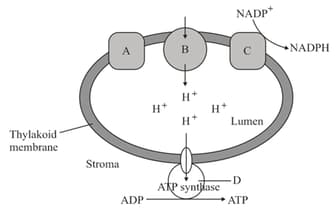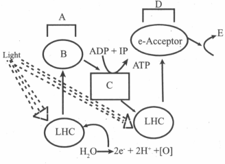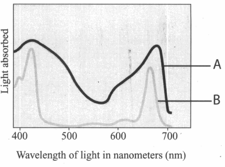Photochemical Phase of Photosynthesis
Photochemical Phase of Photosynthesis: Overview
This topic covers concepts, such as, Absorption Spectrum, Action Spectrum, Red Drop Effect & ATP Synthase etc.
Important Questions on Photochemical Phase of Photosynthesis
Through the use of oxygen-18 (heavy oxygen), scientists have found that the oxygen released during photosynthesis comes from molecules of:
Which one of the following categories of organisms do not evolve oxygen during photosynthesis?
Hill reaction occurs in
Non-cyclic photophosphorylation does NOT occur in _______.
In carbon dioxide reduction, ATP is
Statement A: PS II is located in the appressed region of grana thylakoid.
Statement B: PS II absorbs light of in visible spectrum.
Choose the right option.
Which of the following is not required in chemiosmosis?
Refer the figure given below and choose the correct option given for all the four parts A, B, C and D.

Proton motive force is created by pumping protons across the
The breakdown of a proton gradient across the thylakoid membrane is due to
Match Column I with Column II and choose the correct option with respect to chloroplast.
| Column-I | Column-II | ||
| A. | Light reaction | (i) | Enzymatic process |
| B. | Dark reaction | (ii) | Synthesis of assimilatory power |
| (iii) | Membranous system | ||
| (iv) | Photolysis of water | ||
| (v) | RuBisCO | ||
What creates the proton gradient across the thylakoid membrane?
The following figure is the pathway of non-cyclic photophosphorylation. In which of the following options, find the correct words for all the given blanks indicated by A, B, C,D and E.

The reaction centre of PS I is ___A___ and the reaction centre of PS II is __B__.
The movement of electron is downhill in terms of redox potential scale in ETS, that means________.
Removal of LHC from the photosystem
What does photosystem consist of?
Water splitting complex is associated with ___A___, which itself is located on the ___B____ side of the membrane of thylakoid.
Oxygen evolving complex
Identify A and B in the following diagram.

